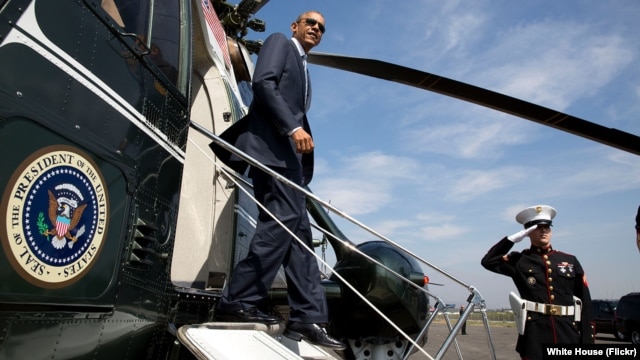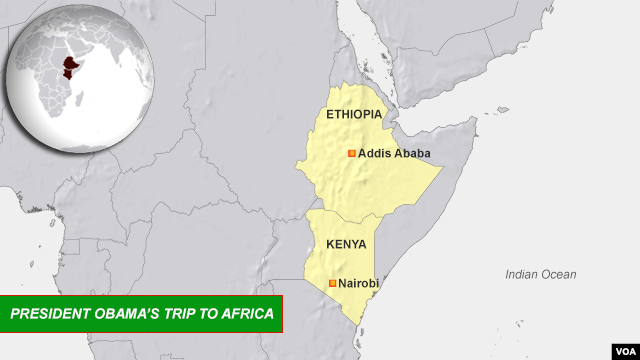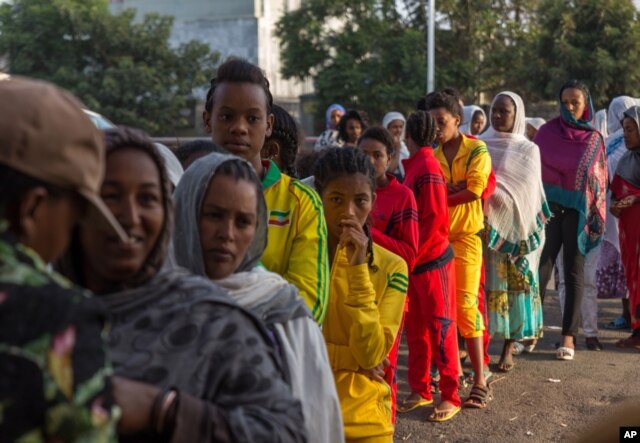Obama to Focus on Counterterrorism During Africa Trip
July 23, 2015 8:33 AM
WHITE HOUSE—
Counterterrorism is expected to be a focus of talks in Nairobi and in Addis Ababa where Barack Obama this weekend will be the first sitting American president to visit Ethiopia and African Union headquarters.
One the eve of his visit, the State Department in recent days renewed its warning of possible terrorist attacks in Kenya. Its travel alert cites numerous attacks by the al-Qaida affiliated group, al-Shabab, including the April assault on Garissa University College in eastern Kenya that killed 148 people, mostly students.
President Obama said earlier this month that he hopes to deliver a message the United States is a strong partner for Kenya and Sub-Saharan Africa in the fight against extremism.
“Build on the progress that’s been made around issues of health and education; focus on counterterrorism issues that are important in East Africa because of al-Shabab and some of the tragedies that have happened inside of Kenya; and continue to encourage democracy and the reduction of corruption inside that country that sometimes has held back this incredibly gifted and blessed country,” Obama said.
WATCH: Related video report by Aru Pande
-------------------------------
WATCH: Related video report by Aru Pande
-------------------------------
Women carrying children run for safety as armed police hunt gunmen who went on a shooting spree in Westgate shopping center in Nairobi, Sept. 21, 2013.
Terrorism concerns
The U.S. president’s visit comes just days after the reopening of Nairobi’s Westgate Mall, where al-Shabaab militants gunned down 67 people in a 2013 siege.
In “Lessons from Garissa,” former U.S. Ambassador to Kenya William Mark Bellamy writes that with such attacks, al-Shabab hopes to drive Kenyan forces out of Somalia, divide and pit Kenya’s religious and ethnic communities against each other, and provoke harsh overreactions by the Kenyan government and its security forces.
The al-Qaida-affiliated group appears to be achieving this last goal, Bellamy writes, citing security crackdowns targeting Muslim communities, with thousands of ethnic Somalis rounded up and threatened with prosecution and deportation.
The Center for Strategic and International Studies senior adviser says aside from the victimization of civilian communities, corruption is also rampant among Kenyan security forces.
Former ambassador Bellamy told VOA the Kenyan government will likely hope for increased U.S. security assistance during President Obama’s visit.
“We have many different forms of assistance we can provide, but a key, crucial element in all of this is the need to undertake reforms within the Kenyan security services," Bellamy said.
"It is not going to be a matter of giving more equipment and training and intelligence to the Kenyan security services. There are also a number of steps the Kenyans need to take to deal with some of their serious internal shortcomings," he added.
Bronwyn Bruton, an analyst with the Atlantic Council, said that while Kenya may need U.S. help in its fight against al-Shabab, it must first tackle its lack of capacity and willingness to undertake proper counterterrorism strategies.
“Time and time again you see a situation where al-Shabab strikes and what makes headlines afterwards," Bruton said. "Yes, al-Shabab’s brutality, but also the ineffectiveness of the police response, in the case of the Westgate attack, and in the case of the Garissa university attack.”
“In both of those cases, you have police brutality coupled with an immense degree of corruption and I think it greatly diminishes the citizens’ confidence in government,” she said.
Voters queue early in the morning to cast their votes in Ethiopia's general election, in Addis Ababa, Ethiopia, May 24, 2015.
Human rights in Ethiopia
Counterterrorism efforts against Islamist militant groups will likely play a role in President Obama’s trip to Kenya’s neighbor, Ethiopia.
Jeffrey Smith, an analyst with the Washington-based Robert F. Kennedy Center for Justice and Human Rights, says the United States sees Ethiopia as a key ally in the region, particularly in the fight against al-Shabab.
“We’ve seen the cross border attacks in Kenya, we have seen the havoc they’ve wreaked in Somalia, and Ethiopia is really seen as a bulwark against that, not only in terms of regional cooperation, but by contributing troops to AU peacekeeping missions across the continent,” Smith said.
“So in that regard, particularly their role in the Sudan crisis, the South Sudan crisis, their role as sort of a regional mediator," he added.
But Smith, who wrote an opinion piece in Foreign Policy magazine titled“Obama Should Stay Away from Ethiopia,” says Obama’s visit sends the wrong message, citing Ethiopia’s repressive regime.
“What people don’t know is that Ethiopia is the fourth most censored country in the world. They are the second jailor of journalists on the entire continent, second to Eritrea,” Smith said.
“Since 2010, 60 journalists have fled the country due to intimidation, harassment and persecution," he said.
Calls trip a mistake
The Atlantic Council’s Bruton, who has met with Muslim democratic activists in Ethiopia, some who were recently found guilty of terrorism, also calls Obama’s trip a mistake.
“The fact that Ethiopia is getting a visit from President Obama in the wake of that guilty verdict and in the wake of sweeping the election, taking 100 percent of the seats, sends a disastrous message to the Ethiopian government,” Bruton said.
Still, U.S. officials say the trip sends an important message.
A senior Obama administration official told VOA the United States regularly urges reforms and communicates its human rights concerns with the Ethiopian government, both in public and in private.
The administration official said the United States believes the Ethiopian government “has inappropriately used its 2009 Anti-Terrorism Proclamation (ATP) to jail journalists and opposition party members."
When asked why Obama was choosing to travel to Ethiopia, the official said “we engage so that we can urge and shape behavior in these areas.”
Dan Joseph contributed to this report





No comments:
Post a Comment